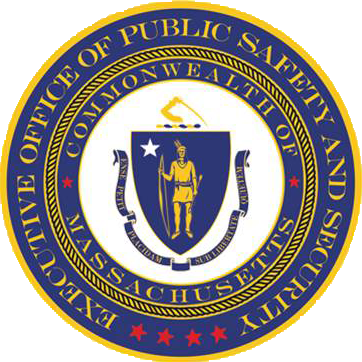- Massachusetts State Police
- Executive Office of Public Safety and Security
Media Contact
Timothy McGuirk, Communications
Framingham — As part of the ongoing commitment to ensure the safety of those studying and working at colleges and universities, the Massachusetts State Police convened 100 campus leaders last week for a two-day training program, Navigating Through Campus Conflict. Designed in partnership with the International Association of Campus Law Enforcement Administrators and Rutgers University Miller Center on Policing and Community Resilience, the comprehensive training addressed the urgent and growing concerns of administrators and public safety officials surrounding intimidation, terroristic threats, harassment, and violence towards students and faculty members.
The training fulfills a core objective of the Department’s Excellence Initiative to build upon the longstanding commitment to community engagement through inclusive programming and public safety partnerships. Each of the program’s 10 modules deepens the participants’ understanding of hate crimes, bias incidents, harassment, vandalism, direct threats, and conflict; ensures institutions understand their legal reporting responsibilities under federal law; empowers leaders with tools to formulate effective, immediate response strategies to protect victims, many of whom represent vulnerable communities; and shares proven, long-term prevention measures to earn and maintain a positive campus culture for students, faculty, families, and other stakeholders.
“It is essential that everyone who studies, teaches and works at our colleges and universities feels safe and welcome,” said Governor Maura Healey. “I'm grateful for the leadership of the Massachusetts State Police to enhance public safety on campuses, prevent hate and build a positive environment for everyone.”
“College and universities contribute so much to our communities and our economy, but we all have a role to play in ensuring campuses are safe for everyone,” said Lieutenant Governor Kim Driscoll. “Every participating institution has demonstrated their commitment to upholding the values of respect, inclusion and dialogue, and we will all be better off because of that.”
“As colleges and universities strive to fulfill their teaching and research missions, they need tools to respond to acute pressures often beyond their control that can manifest in forms of hostility and hate,” said Public Safety and Security Secretary Terrence Reidy. “Thanks to the work of the State Police and their partners, this program provides an essential forum for institutions to learn best practices and incorporate them into decisions about the safety of their students, faculty, and staff.”
“The Massachusetts State Police recognizes the importance of colleges and universities in the life of our Commonwealth, and we share the commitment of the Healey-Driscoll Administration to support their success,” said Colonel Geoffrey Noble. “The extraordinary teaching and research for which Massachusetts institutions are known depends on safe campuses free from all forms of hate and hostility. We appreciate the partners who shared their expertise as part of each module and the participants who offered their lived experience with these complex issues. I hope we continue facilitating these conversations as an extension of our Excellence Initiative for the benefit of our residents, students, faculty, and staff.”
“America’s campuses are no longer insulated from the global unrest we see on the evening news — they have become battlegrounds of ideology, identity, and safety,” said Miller Center Chief Advisor on Policy and International Policing Paul Goldenberg. “This training isn’t just timely; it’s essential. We’re giving campus leaders and law enforcement the tools they need to defuse conflict, safeguard free speech, and protect every student — no matter their background — from hate and harm. That’s why working alongside Colonel Noble and the Massachusetts State Police has been so vital; their partnership sends a powerful message that campus safety is a matter of public safety, and it brings unmatched experience and authority to this urgent national effort.”
“This training could not be more necessary,” said Chief Paul Cell (Ret.), Executive Director of the International Association of Campus Law Enforcement Administrators. “Colleges and universities are facing a convergence of complex and deeply rooted challenges that demand collaborative, informed, and practical solutions. That’s exactly what this program delivers — solutions developed by and for the professionals responsible for ensuring campus safety and resilience. We are deeply grateful to the Massachusetts State Police for stepping up as a host and partner for this event. Their commitment to higher education is a perfect example of how meaningful collaboration can drive real solutions to the challenges facing today’s campuses.”
Experts leading the two-day training represent a broad range of experience in a variety of organizations, including local, state, and federal law enforcement, public and private universities, and prosecutors with experience prosecuting hate crimes. From the State Police, members assigned to the Hate Crimes Awareness and Response Team (HART), the Commonwealth Fusion Center, the Special Emergency Response Team, and the Academy Instructional Staff will contribute to the program. A video summary of the training is available here.
Throughout their Administration, Governor Healey and Lieutenant Governor Kim Driscoll have devoted significant resources to confront and deter hate crimes, support victims, and foster community resilience across Massachusetts. As part of their steadfast commitment to promoting inclusivity and safeguarding diverse communities, the administration has awarded $24.5 million in Hate Crime Prevention Grants through the Office of Grants and Research within the Executive Office of Public Safety and Security. Each grant is designed to support or expand programs that help educators, staff, administrators, and students reduce incidents of bias in schools.
Statements of Support:
“As one of the most diverse and innovative regions in the nation, it is important that bring those same skills and energy to confronting hate and bias, particularly on our college campuses. This training is a part of our proactive, coordinated efforts which help colleges to keep their commitment to their students, the families who entrust them with those students and the faculty and staff for whom the college is a workplace. Thank you to the Miller Center, ICLEA and the Massachusetts State Police for making this training available.” – Middlesex District Attorney Marian Ryan
“The Massachusetts Association of Campus Law Enforcement Administrators was happy to welcome our members as listeners, presenters and collaborators on this pivotal training program. As we look forward to our college students returning to our Massachusetts campuses this fall, it was a timely opportunity for our campus police leaders to engage in meaningful, thought provoking and challenging discussions with national and international leaders on best practices regarding hate & bias crimes, violence and intimidation. The backbone of our work in campus policing rests in community engagement, relationship building, trust and communications and the NTCC program offered unique perspectives about leveraging this work to better support our students and community members, facing bias, hate, violence and intimidation within the Commonwealth. We thank all our partner agencies and associations for hosting and offering this practical training experience.” – Massachusetts Association of Campus Law Enforcement Administrators President and Endicott College Chief of Police Kerry Ramsdell
“I currently serve as the Chief of Police for the University of Massachusetts, Boston Campus. Regarding the Creating Effective Campus Community Outreach program, I am honored to be part of an initiative that fosters strong partnerships between the State Police and campus communities. Being involved in this program means actively contributing to a culture of trust, safety, and mutual respect, which is essential for promoting an inclusive and secure environment on campuses. Our collaboration supports positive engagement that empowers students, faculty, and staff to work together towards shared goals of safety and well-being.” – Stacey Lloyd, Ph.D., Chief of Police and Director of Public Safety, University of Massachusetts, Boston
###

